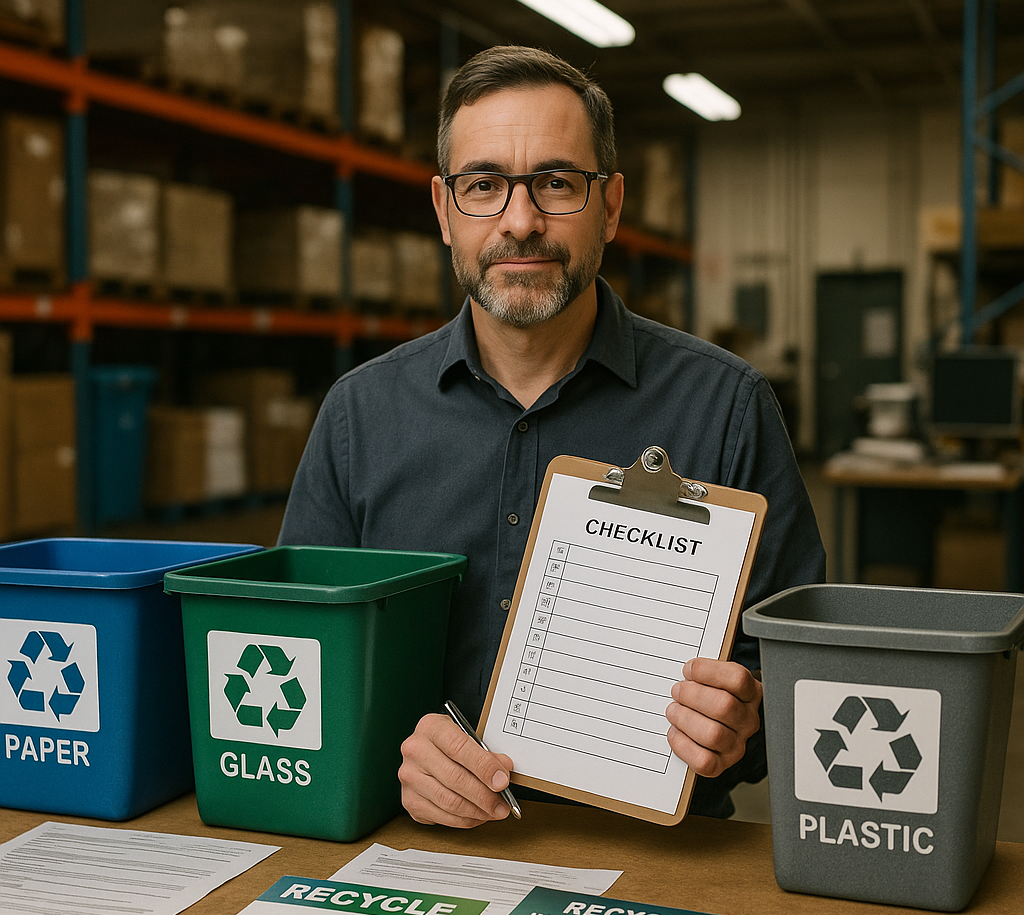5901 Botham Jean Blvd, Dallas, TX 75215
Business Recycling Incentives: What They Are and How to Qualify
August 17, 2025Business recycling incentives are financial rewards and programs designed to motivate companies to enhance their recycling efforts and reduce waste. These incentives are a growing strategy within the waste management sector, aligning environmental goals with economic benefits.
The incentives take various forms. Tax abatements allow businesses to decrease their tax liability by implementing qualifying recycling systems. Grants provide direct funding for recycling infrastructure investments. Many municipalities offer reduced waste disposal fees for companies separating recyclables from general waste. Some programs also create revenue opportunities by connecting businesses with markets for their recyclable materials.
According to EPA data, recycling programs offer significant economic benefits beyond environmental impact. The recycling industry generates 681,000 jobs and $37.8 billion in wages annually in the United States. For businesses of all sizes, these incentives can transform sustainability initiatives into potential profit drivers.
What Types of Recycling Incentives Are Available for Businesses?

Businesses looking to enhance sustainability efforts can access various financial incentives that make recycling more economically viable. These incentives not only reduce the financial burden of implementing recycling programs but also create new revenue streams. Let’s explore the main types of incentives available today.
Tax Abatements and Credits
Tax incentives offer direct financial benefits for businesses investing in recycling infrastructure. These come in several forms across different states and municipalities:
- Personal Property Tax Abatements – Up to 50% reduction on taxes for recycling equipment over periods of up to 10 years. Nevada, for example, offers this significant reduction for qualified recycling businesses.
- Sales and Use Tax Exemptions – Reduced tax rates (sometimes as low as 2%) on qualified capital equipment purchases related to recycling operations.
- Income Tax Credits – Some states provide credits ranging from $500 to $750 for each $100,000 invested in recycling initiatives, as seen in Delaware’s Green Industries Initiative.
- Real Property Tax Abatements – Specialized tax reductions of up to 50% for 10 years on real property for qualified recycling businesses.
Qualifying for these incentives typically requires businesses to meet specific criteria such as job creation, minimum capital investment, or processing certain percentages of post-consumer waste.
Grants and Direct Funding
Unlike tax incentives that reduce existing obligations, grants provide upfront capital for recycling initiatives:
- Start-up Recycling Grants – These provide full funding for initial recycling program implementation, often available through state environmental protection agencies.
- Matching Fund Programs – Government programs where businesses must match a percentage of provided funds. The EPA’s Jobs Through Recycling program requires a minimum 25% match from businesses while providing significant federal funding.
- Equipment-Specific Grants – Targeted funding for purchasing recycling infrastructure like bins, balers, or specialized processing equipment.
- Technical Assistance Grants – Funding that includes expert consultation on program design and implementation alongside financial support.
These grant programs often prioritize projects with significant environmental impact or those addressing hard-to-recycle materials.
Waste Fee Reductions
Many municipalities offer direct savings on waste management costs for businesses that implement effective recycling:
- Reduced Disposal Fees – Businesses that separate more waste at the source often qualify for lower waste collection and disposal fees.
- Performance-Based Discounts – Meeting or exceeding recycling targets can trigger automatic reductions in waste management costs.
- Volume-Based Pricing – As recycling increases and landfill waste decreases, businesses benefit from lower waste hauling costs under pay-as-you-throw systems.
These incentives directly improve cash flow by reducing monthly operational expenses.
Rewards and Rebate Programs
Some regions have implemented innovative incentive structures that provide direct financial returns for recycling success:
- Material Buyback Programs – Payments for high-value recyclables like metals, certain plastics, or specialized materials.
- Voucher Systems – Businesses receive credits or vouchers based on recycling volume that can be applied to other services or converted to cash.
- Insurance Discounts – Some insurance providers offer premium reductions for businesses with comprehensive recycling policies, particularly for those with green certifications.
The financial value of these programs varies widely by location and material type, with higher value typically assigned to metals, clean paper, and certain plastics.
| Incentive Type | Benefits | States Offering |
| Personal Property Tax Abatements | Up to 50% reduction on taxes for recycling equipment over periods of up to 10 years | Nevada, among others |
| Sales and Use Tax Exemptions | Reduced tax rates on qualified capital equipment purchases related to recycling | Various states |
| Income Tax Credits | Credits ranging from $500 to $750 for each $100,000 invested in recycling initiatives | Delaware’s Green Industries Initiative |
| Grants and Direct Funding | Direct funding for recycling infrastructure investments | Available through various state programs |
| Waste Fee Reductions | Lower waste collection and disposal fees for businesses meeting recycling targets | Many municipalities |
Industry-Specific Incentives
Certain sectors qualify for specialized recycling incentives based on their environmental impact or material usage:
- Manufacturing Incentives – Tax breaks specifically for manufacturers investing in recycled content or recyclable packaging.
- Construction Industry Programs – Special grants and tax benefits for construction companies that recycle building materials or use recycled content.
- Technology Sector Rebates – Specialized programs for companies recycling electronic waste or implementing innovative recycling technologies.
These targeted incentives recognize the unique waste streams and recycling opportunities in different business sectors.
With such a diverse array of financial incentives available, businesses of all sizes can find options that make recycling not just environmentally responsible but economically advantageous. Taking the time to research specific programs in your state or municipality can yield significant financial benefits while advancing sustainability goals.
How Can Businesses Qualify for Recycling Incentives?

Most recycling incentive programs require businesses to establish a formal recycling program before applying for funding. This typically includes conducting a waste assessment, establishing collection systems, and documenting waste diversion rates. Programs in states like California require businesses generating four cubic yards or more of commercial solid waste per week to arrange for recycling services through self-hauling, subscribing to haulers, or implementing mixed waste processing.
Investing in recycling equipment often qualifies businesses for significant tax benefits. Many states offer equipment-focused incentives, such as income tax credits ranging from 5 to 50 percent of equipment costs. For example, Arkansas provides a 30 percent income tax credit for recycling equipment that handles at least 10 percent postconsumer solid waste. Similarly, Idaho offers up to 20 percent credit on equipment costs, while Montana provides a tiered system with a 25 percent credit for the first $250,000 invested.
Meeting specific recycling targets is another common qualification requirement. Businesses must often demonstrate measurable waste reduction results through regular monitoring and reporting. This includes tracking the volume of materials recycled, contamination rates, and calculating recycling rates using formulas that compare recycled materials to total waste generated. These metrics help prove program effectiveness and maintain eligibility for continued funding.
Industry-specific criteria apply to many recycling incentive programs. Manufacturing industries often receive preferential consideration, particularly those incorporating recycled materials into their production processes. For instance, Delaware offers recycling investment tax credits for businesses that use at least 25 percent recycled materials by weight. Nevada provides property tax exemptions specifically for manufacturing and recycling companies that meet the state’s job creation goals and use raw materials from within the state.
Financial matching requirements are common in many recycling grant programs. The Ohio EPA’s recycling grants, for example, require different matching percentages based on program type: Community and Litter grants require a 25 percent match, while Market Development and Scrap Tire grants require a 100 percent match. These matching funds must typically be cash or credit, with “in-kind” contributions or funds from other grant programs often prohibited.
Program maintenance commitments are frequently required to qualify for recycling incentives. Businesses must demonstrate their long-term commitment to recycling initiatives by maintaining programs for specified periods. This includes ongoing employee training, regular waste assessments, and continuous improvement of collection systems. Programs may require businesses to report regularly on their recycling metrics and demonstrate consistent waste diversion results.
Geographic location can influence qualification criteria, as many incentives are location-specific. Some programs, like Utah’s recycling income tax credits, are only available for recyclers located in designated Recycling Market Development Zones. Others provide enhanced benefits for businesses operating in specific regions or addressing particular local environmental priorities.
Here are the basic steps for qualifying for recycling incentives:
- Research available programs in your state and local area
- Conduct a waste assessment to identify recyclable materials
- Implement a formal recycling program with proper collection systems
- Invest in necessary recycling equipment and infrastructure
- Track and document waste diversion and recycling rates
- Prepare required application materials, including financial statements
- Submit applications by program deadlines
- Maintain program requirements for the duration of the incentive period
Job creation elements appear in several incentive programs. New Mexico’s recycling equipment income tax credit is limited to equipment that creates jobs rather than reducing the workforce. Similarly, Florida offers a recycling employment income tax credit of $500 for each new employee added as a result of incorporating recycled products into production processes.
Environmental compliance is a prerequisite for most recycling incentives. Ohio’s EPA specifies that applicants must be in good financial standing with the state and have no outstanding environmental compliance issues. This highlights the importance of maintaining broader regulatory compliance to access sustainability incentives.
| State | Type of Incentive | Requirements |
|---|---|---|
| Tennessee | Tax Incentive | Manufacturers as a means to increase industry |
| Nebraska | Tax Incentive | Manufacturers as a means to increase industry |
| Delaware | Income Tax Credit | $500 to $750 for each $100,000 invested |
| California | Tax Credits | Franchise tax board estimated $2,127,816 claimed from 1989 to 1993 |
| Montana | Investment Credit | 25% credit for the first $250,000 invested |
Each jurisdiction implements recycling programs differently, with varying requirements for education, outreach, and monitoring. Businesses should contact their local recycling coordinators to understand specific requirements in their communities, as some areas have mandatory commercial recycling ordinances with different thresholds or more specific business recycling requirements than state laws. Always check with local authorities for the most current qualification criteria before applying for recycling incentives.
What Are the Benefits of Recycling Incentives for Businesses?

Implementing recycling programs allows businesses to access incentives that provide substantial financial and operational benefits. These incentives transform waste management from a cost center into a strategic business asset. Companies leveraging these opportunities often improve their financial performance and enhance their reputations.
Financial Savings Through Tax Benefits
One of the most compelling advantages of recycling incentives is the tax benefits. State and federal governments offer various incentives to encourage sustainable business practices, such as substantial tax credits for investing in recycling equipment and infrastructure.
For instance, some states provide income tax credits covering up to 30% of recycling equipment costs. Delaware’s Green Industries Initiative offers income tax credits of $500 to $750 for every $100,000 invested in recycling technology. These credits directly reduce a company’s tax liability, freeing capital for other investments.
Additionally, businesses may qualify for sales tax exemptions on recycling equipment purchases. States like Utah, Kentucky, and Virginia have implemented such exemptions for recycling machinery, allowing businesses to save significantly on implementation costs.
Reduced Operational Costs
Beyond tax benefits, recycling initiatives substantially lower operational expenses. Companies with effective recycling programs typically see significant reductions in waste disposal costs. As landfill tipping fees continue to climb due to limited space and stricter regulations, diverting waste through recycling becomes increasingly cost-effective.
A well-designed recycling program can save approximately $100 per employee annually from reduced waste hauling fees, lower disposal costs, and decreased need for raw materials. For larger organizations, these savings quickly add up.
Centralized recycling programs also enhance cost savings by reducing janitorial expenses. When custodial staff no longer need to collect waste from individual desks, they can focus on other essential tasks, thereby improving facility management efficiency.
Creating New Revenue Streams
Recycling turns waste from an expense into a potential revenue source. Many recyclable materials have market value that businesses can capitalize on. Metals, plastics, paper, and cardboard can be sold to recyclers, creating an additional income stream from materials that would otherwise be discarded.
Approximately 2-3% of all post-recycled waste is metal, which can be sold to generate revenue. Companies can develop relationships with recycling processors who purchase these materials, sometimes creating ongoing revenue partnerships that offset program implementation costs.
Some organizations have turned their recycling efforts into profitable ventures. By properly sorting and maintaining the quality of recyclable materials, businesses can maximize their value and turn what was once waste into a valuable commodity.
Enhanced Brand Image and Customer Attraction
Beyond immediate financial gains, recycling incentives enhance brand reputation, appealing to environmentally conscious consumers and stakeholders. Modern consumers increasingly assess a company’s environmental practices when making purchasing decisions. Businesses promoting their recycling efforts and sustainability commitments often attract loyal customers who share these values, leading to increased sales and customer loyalty.
Environmental initiatives also help businesses stand out in competitive markets. Companies can highlight their recycling programs in marketing materials and corporate communications to differentiate themselves from competitors who haven’t embraced sustainability.
Improved Employee Recruitment and Retention
Sustainability programs significantly impact a company’s ability to attract and retain talent. Studies show that employees, particularly millennials, are more motivated to work for companies with strong environmental commitments. Nearly one in ten millennials would consider leaving a job if their employer wasn’t committed to sustainability practices.
Recycling programs create a positive workplace culture where employees feel their company is making responsible choices. This shared commitment to environmental stewardship builds community within organizations and contributes to higher job satisfaction and employee retention rates.
By investing in recycling initiatives, businesses create workplaces that align with employee values, making them more attractive employers in competitive job markets. This alignment reduces recruitment costs and helps maintain institutional knowledge through improved retention.
Regulatory Compliance and Risk Reduction
Implementing recycling programs helps businesses avoid fines for improper waste disposal. As environmental regulations become increasingly stringent, companies face potential penalties for non-compliance. Recycling initiatives ensure businesses meet or exceed regulatory requirements, reducing legal and financial risks.
Beyond avoiding fines, recycling programs help mitigate broader business risks. By reducing environmental impacts, companies decrease their vulnerability to resource shortages, supply chain disruptions, and reputation damage from environmental incidents.
These risk reduction benefits provide long-term financial security that complements the immediate savings from recycling incentives. Forward-thinking businesses recognize that sustainability initiatives are essential risk management strategies in today’s regulatory environment.
| Incentive Type | Benefit | Example |
|---|---|---|
| Tax Abatements and Credits | Reduces tax liability through deductions and credits. | Nevada offers up to 50% reduction on taxes for recycling equipment. |
| Grants and Direct Funding | Provides upfront capital for implementing recycling programs. | EPA’s Jobs Through Recycling program requires a match but offers significant federal funding. |
| Waste Fee Reductions | Reduction in waste disposal costs for effective recycling. | Volume-based pricing benefits under pay-as-you-throw systems. |
| Rewards and Rebate Programs | Financial returns for recycling achievements. | Material buyback programs pay for high-value recyclables. |
| Industry-Specific Incentives | Special incentives for specific sectors based on environmental impact. | Tax breaks for manufacturers using recyclable packaging. |
Final Words
Business recycling incentives represent a powerful intersection between environmental responsibility and financial opportunity.
By taking advantage of tax abatements, grants, waste fee reductions, and other rewards, companies can transform sustainability from a compliance requirement into a strategic growth tool. These programs not only reduce operational costs and generate new revenue streams, but they also strengthen brand reputation, attract eco-conscious customers, and enhance employee satisfaction.
With the growing emphasis on corporate environmental responsibility, the businesses that act now to implement robust recycling programs will be better positioned for long-term success. From meeting regulatory requirements to gaining a competitive edge in the marketplace, the benefits of participating in recycling incentive programs extend far beyond immediate financial returns.
Turn your recycling efforts into real business savings and opportunities. Call Okon Recycling at 214-717-4083 for your metal recycling needs.
